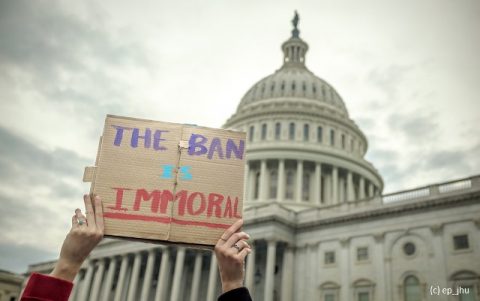Opinion: Gaming the US System: Trump’s Executive Orders on Immigration
May 17, 2017
 IMADR Director, Michael O. Sharpe, raises an alarm over the recent U.S. President’s executive orders on immigration as a challenge to the foundation of democracy and human rights.
IMADR Director, Michael O. Sharpe, raises an alarm over the recent U.S. President’s executive orders on immigration as a challenge to the foundation of democracy and human rights.
– – – – –
US President Trump has attempted to game the system with two controversial executive orders that test the resilience of US democratic principles and institutions with far reaching internal and international consequences. These executive orders appear to establish a religious test for entry into the US and violate the bedrock US founding constitutional principles of religious liberty, equal protection, and due process of law. Executive orders allow US presidents to direct officers and agencies of the US federal government and have the full force of law as established by the US Constitution but are subject to judicial review and can be overturned if deemed unconstitutional or contrary to statues. The two executive orders in question are purportedly Trump’s plan of “extreme vetting” to keep “radical Islamic terrorists” out of the United States. The initial executive order signed by President Trump on January 27 blocked all refugees from entering the US for 120 days, Syrian refugees indefinitely, and banned citizens from seven majority Muslim majority countries from entering the US for some 90 days, namely, Iran, Somalia, Iraq, Libya, Sudan, Syria, and Yemen. Trump’s executive order does not protect Muslims refugees fleeing persecution and war. Moreover, no immigrants or refugees from the seven targeted Muslim countries had committed fatal terrorist attacks on US soil. Although the Trump administration claimed it was not a “Muslim ban,” it appeared to be so because it favored admission for minority religions in the region, specifically Christianity over Islam. It was rather unclear as to whether the ban applied to green card holders and then it was later clarified by the Secretary of the Department of Homeland Security that it would not unless there is information indicating that an individual is a threat to public safety. The rushed and bungled implementation of the travel ban resulted in immigrants being barred from entry into the US, detained at airports or even deported prompting nationwide demonstrations and actions in solidarity with the targeted migrants and refugees. Federal judges acted in several states including New York, Virginia, Washington, and Massachusetts addressing various issues as a result of the executive order including individuals detained in airports, allowing access to legal counsel, and detention and removal temporarily completely halting Trump’s executive order and this was affirmed by the US 9th Circuit Court of Appeals.
Trump issued a second “watered down” executive order on March 6 that he hoped would address the initial legal concerns. The measure banned people from six predominantly Muslim countries namely, Iran, Somalia, Libya, Sudan, Syria, and Yemen for 90 days and all refugees for 120 days. Iraq was taken out with the rationale that it had updated its screening procedures to US standards but some speculate that this was done because of complaints that many Iraqis had risked their lives to help the US during its war effort in Iraq. Additionally, it removed the clause for persecuted religious minorities and does not apply to those with green cards and visas. This executive order was blocked by federal judges in Hawaii and Maryland arguing that the most recent ban discriminated against Muslims and hence the US constitutional provision of religious freedom. Trump argued that this is necessary for national security and to protect the United States from terrorist attacks. The US Justice Department will appeal to the more conservative US 4th District Court of Appeals. Trump has vowed to take this all the way to the US Supreme Court, the highest court in the United States. As the nine person US Supreme Court remains with eight justices, evenly divided four conservatives and four liberals and Trump’s nominee for the ninth justice Neil Gorsuch awaiting confirmation, the fate of the executive orders hang in the balance as an indicator of the embrace or disavowal of US principles and institutions.
How to Reconcile the US System with its Deeply Racist Past?
The United States has a system of “separation of powers” and “checks and balances” between the executive, the legislature, and the judiciary that is designed to preserve liberty and prevent the “tyranny of the majority”. …Read the full article ![]()
.
Related Content

Newsletter E-CONNECT No.40 is out

Newsletter E-CONNECT No.39 is out

Newsletter E-CONNECT No.38 is out


